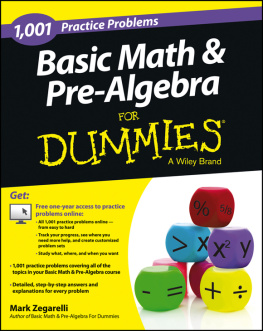sorry something went wrong loading your content. Check the table of contents or try paging forward. Or contact us at support@bookshout.com
sorry something went wrong loading your content. Check the table of contents or try paging forward. Or contact us at support@bookshout.com
sorry something went wrong loading your content. Check the table of contents or try paging forward. Or contact us at support@bookshout.com
Chapter 1
Study Strategies
Lets face it: becoming good at math takes work. Not only do you have to study; you have to study hard. But studying hard isnt enough. If youre studying the wrong way, all of your work is not going to pay off. After all, practice only makes things permanent, but practicing the right way makes them perfect. This means that if youre practicing incorrectly, youre just cementing bad habits into place. Thats actually even worse than doing nothing! And you certainly shouldnt waste your time doing work that isnt helping. Before you start learning all the details of pre-algebra math, it is important to review how to study pre-algebra. This chapter will give you some ideas as to how you can effectively study so that you can use this book in the way thats most helpful to you. Your goal should be to pick up a few pointers, so that when the quiz or test or final comes along, youll be able to show what youve learned!
Dont Call Yourself Bad at Math
All students encounter subjects that come naturally to them and concepts that they find a little bit harder to understand. It can be really frustrating to work on something when you feel like the people around you dont have to work quite as hard. But the fact of the matter is that youre reading this book because you have to learn math. Whether its to get ready for high school or to pass a college course, learning pre-algebra is a step you have to complete to get where you want to go.
Most people who believe they are bad at math usually have one or two concepts that they didnt completely understand somewhere within their math education, whether those steps were in second grade or in middle school. When that happens, they have a weak foundation. And when they start trying to build other stuff on top of that foundation, it doesnt go very well. That doesnt mean they are bad at math. It just means they have to find the area or areas they dont really understand and spend a little time fixing the foundation in that area.
If you dont like math, it might be time to switch your mindset. Instead of focusing on liking or disliking math, focus on liking the feeling of understanding something. When the goal is to understand a concept instead of to enjoy that concept, its easier to achieve.
Dont ever say you cant do math. Can you split a bag of candy in half? Can you figure out how much money two things will cost when you know the price of each one? Can you calculate how much money youll earn this month if you earn $5 every day? Then you can do math. Math on paper (and in class, on quizzes, and on tests) is just a code that represents what happens with numbers in the real world. Learn the code, one piece at a time, and youll be able to do it.
Ask for Help
This is one of the most important actions you can take, because its something that students dont often think to do. Asking for help doesnt mean that you cant do it yourself. It doesnt mean youre stupid. It doesnt mean you dont know what youre doing.
What it means is that youre a good student. Good students ask for help, wherever they can get it. Thats how you learn. The people who learn the most in life are the ones who ask questions.
Whether youre totally lost, or you just have one little question, get an answer. Math builds on itself, and if there is a hole in your understanding, your foundation for future topics is going to be weak. Ask your classmates. Ask your older brother or sister. Ask your parent or tutor. Ask in a forum online. And, of course, ask your teacher! Dont just ask the day before the testask as soon as the problem comes up.
There are so many great resources for learning and practicing pre-algebra online. If the explanation in your textbook or class doesnt make sense to you, try doing a Google or YouTube search for the topic at hand. Sometimes a slight change in the wording of an explanation is enough to make something click!
Explain It to Someone Else
Sometimes you hear your teacher explain a concept in class, and it makes perfect sense. Then you get home to do your homework, and you just cant figure out how to get to the answer. Other times, it doesnt make sense even during class, but everyone else seems to get it.
If you think you dont understand a concept, try explaining it to someone else. Maybe youll be able to explain it, and then youll see that you really do understand it. If not, youll be able to clarify what it is that youre having trouble with, because it will be where you get stuck during the explanation. Explaining is a way to make sure you understand the reasoning behind each step. When you understand the reasoning, youll really understand whats going on. Thats the road to success.
This is really hard to do, but it works. Its much harder to try to explain something than to have it explained to you, because it makes you vulnerable. But dont be afraid to make a mistake: this is an excellent way to learn. Try to explain to someone who already knows the material so that he or she can tell you if youre making a mistake and help you when you get stuck. Give it a try!
Take It One Bite at a Time
Some math problems involve using ten or twenty different skills. It looks like one problem, but it has a whole series of intricate steps and skills that have to be done correctly to get the right answer!
If you are having trouble, break the problem down one step at a time to see if you can catch where your mistake is occurring. Maybe you actually understand the concept, but youre making an arithmetic mistake. Maybe you are doing all the arithmetic right, but you dont understand exactly what the question is asking you to find. If you can figure out which step youre having trouble with, you can get a better explanation, re-read your textbook, or do some more practice problems of the same type.
Dont try to go too fast. Everyone learns at his or her own speed, and if you dont understand a concept yet, you havent really learned it. If you feel like class is going too fast for you, you should try to schedule some extra practice time each week. That will slow down the speed at which you have to learn, which will allow you to go at your own pace.
Cement Good Habits
Doing something correctly once is not enough to say that you know it. Its proof that you can do it, but its just a start to really learning. Once youve learned something, you know how to do it when it shows up again.
That means that you have to practice the steps you take to solve a problem enough times that they are consistent and comfortable in the future. The best way to practice math is to practice in short, frequent study sessions. When you try to cram while learning a skill, you dont get the most out of the problems. If you do thirty of the same problem type in a row, you are really only thinking on the first one; after that, youre basically copying what you did on the previous problem. But if you do ten problems today, and then ten again tomorrow, and then ten later in the day, you will probably remember the steps much more clearly.
Math is a skill, and its best learned the way you learn other skills, like playing a sport or a musical instrument. Just like you cant abstain from exercise all week and then complete eight hours of football practice on Sunday without an issue, you really shouldnt try to cram for math.
Next page
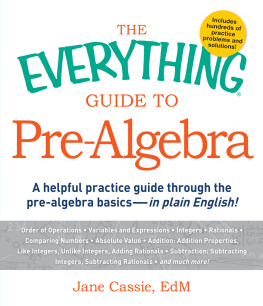
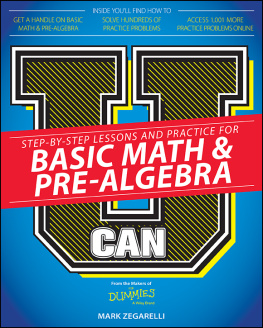
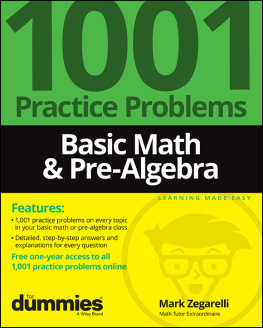

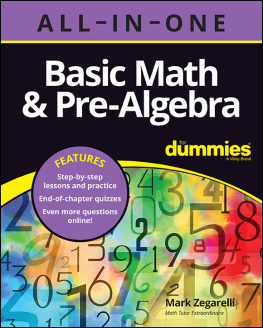

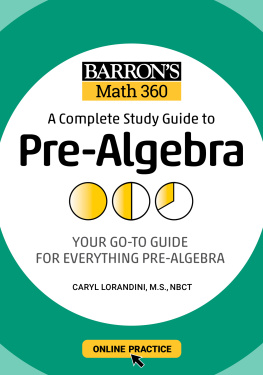
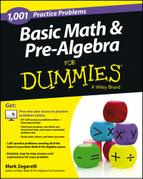
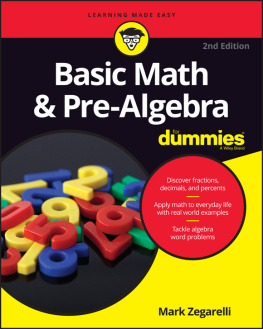
![Debra Anne Ross [Debra Anne Ross] - Master Math: Basic Math and Pre-Algebra](/uploads/posts/book/119083/thumbs/debra-anne-ross-debra-anne-ross-master-math.jpg)
